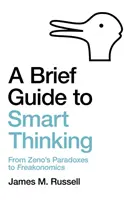Ocena:

Obecnie brak opinii czytelników. Ocena opiera się na 11 głosach.
A Brief Guide to Smart Thinking: From Zeno's Paradoxes to Freakonomics
Każda książka jest podsumowana, aby przekazać krótkie pojęcie o tym, co każda z nich ma do zaoferowania zainteresowanemu czytelnikowi, podczas gdy „Szybkie czytanie” dla każdej książki zapewnia szybkie wyczucie tego, jak wygląda czytanie każdej książki i wysoce skompresowane podsumowanie głównych punktów danej książki. Omawiane tytuły obejmują prowokujące do myślenia klasyki z zakresu psychologii, uważności, racjonalności, mózgu, myśli matematycznej i ekonomicznej oraz filozofii praktycznej.
Wybór obejmuje książki o samodoskonaleniu, a także historycznie interesujące opisy działania umysłu. Uwzględnione tytuły sięgają tak daleko wstecz, jak klasyczny TheEnchiridion Epikteta i urocze TheABC of Relativity Bertranda Russella, przechodząc przez klasyki, takie jak Lateral Thinking Edwarda de Bono, aż do ery cyfrowej z tytułami takimi jak The Shallows i Big Data. Książki są ułożone chronologicznie, co zwraca uwagę na niektóre z interesujących zestawień i powiązań między nimi.
Niektóre z zawartych tytułów to: Freakonomics, autorstwa Stevena D. Levitta; Blink: The Power of Thinking Without Thinking, autorstwa Malcolma Gladwella; Sapiens: A Brief History of Humankind, autorstwa Yuvala Noaha Harariego; The Organized Mind: Thinking Straight in the Age of Information Overload, autor: Daniel J. Levitin; The Descent of Man, autor: Grayson Perry; How the Mind Works, autor: Steven Pinker; Black Box Thinking: Why Some People Never Learn from Their Mistakes - But Some Do, autorstwa Matthew Syeda; We Should All Be Feminists, autorstwa Chimamandy Ngozi Adichie; Guns, Germs, and Steel: The Fates of Human Societies, autor: Jared Diamond; The Black Swan: The Impact of the Highly Improbable, autor: Nassim Nicholas Taleb; Man's Search for Meaning, autor: Viktor E. Frankl; The News: A User's Manual, autor: Alain de Botton; Mindware: Narzędzia inteligentnego myślenia, Richard E.
Nisbett; The ABC of Relativity, Bertrand Russell; The Psychopath Test, Jon Ronson; The Path: Czego chińscy filozofowie mogą nas nauczyć o dobrym życiu, autor: Michael Puett; Krótka historia czasu, autor: Stephen Hawking; Bałagan: The Power of Disorder to Transform Our Lives, autorstwa Tima Harforda; Big Data: A Revolution That Will Transform How We Live, Work, and Think, autor: Viktor Mayer-Schönberger; Moneyball: Sztuka wygrywania w nieuczciwej grze, autorstwa Michaela Lewisa; The Survivors Club: The Secrets and Science That Could Save Your Life, autor: Ben Sherwood; Black Box Thinking, autor: Matthew Syed; Chaos: Making a New Science, autor: James Gleick; A Short History of Nearly Everything, autor: Bill Bryson; The Shallows: What the Internet Is Doing to Our Brains, Nicholas Carr; Making Ideas Happen: Overcoming the Obstacles Between Vision and Reality, Scott Belsky; The Enchiridion, Epictetus; Gödel, Escher, Bach, Douglas R. Hofstadter; What I Talk About When I Talk About Running, Haruki Murakami; oraz Lateral Thinking, Edward de Bono.